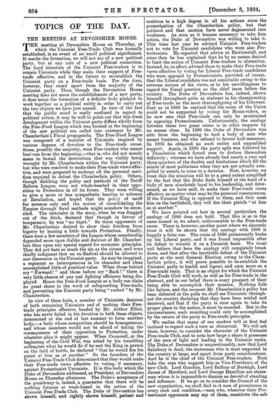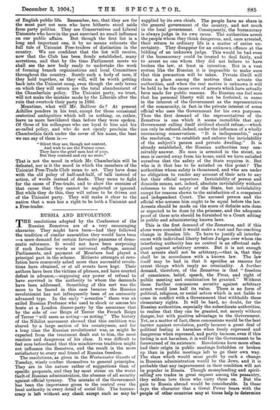THE MEETING AT DEVONSHIRE HOUSE.
It marks the formation, we will not say of a new political party, but at any rate of a new political connection. The fixed intention of the Unionist Free-traders is to remain Unionists while they make their support of Free- trade effective, and in the future to re-establish the ;Unionist party on a Free-trade basis. For the time, however, they stand apart from the majority of the Unionist party. Thus, though the Devonshire House meeting does not mean the establishment of a new party, it does mean the formation of a definite body pledged to work together as a political entity in order to carry out the two objects we have just named. In view of the fact that the public mind is easily confused in regard to political action, it may be well to point out that this fresh development within the Unionist party differs wholly from the Free-Food League which was formed at the beginning of the new political era called. into existence by Mr. Chamberlain's Fiscal propaganda. The Free-Food League was composed of a number of Unionists inspired by various degrees of devotion to the Free-trade cause. Some, possibly the majority, were Free-traders who meant bushess from the beginning,—that is, who did not merely mean to bewail the destruction that was visibly being wrought by Mr. Chamberlain within the Unionist party, but who were resolved to make their Free-trade views effec- tive, and were prepared to undergo all the personal sacri- fices required to defeat the Chamberlain policy. Others, though disliking the policy and methods of the Tariff Reform League, were not whole-hearted. in their oppo- sition to Protection in all its forms. They were willing to give a more or less sympathetic hearing to schemes of Retaliation, and hoped that the poliey of tariff for revenue only and the notion of consolidating the Empire through fiscal methods might somehow be recon- ciled. The teetotaler in the story, when he was dragged out of the ditch, declared that though in favour of temperance, he was "no bigot." So these opponents of Mr. Chamberlain desired to show their freedom from bigotry by leaning a little towards Protection. Finally, there were a few members of the League whose membership depended more upon dislike and distrust of Mr. Chamber- lain than upon any special regard for economic principles. They did not hate so much the sin as the sinner, and were chiefly indignant that an ex-Radical should be allowed to sow dissension in the Unionist party. As may be imagined, a regiment so heterogeneous in its character and ideas accomplished little of practical value. When those behind cry " Forward ! " and those before cry " Back ! " there is very little chance of any real fighting efficiency being dis- played. Hence the Free-Food League as a body can claim no great share in the work of safeguarding Free-trade, and preventing the Unionist party being" rushed "by Mr. Chamberlain.
In view of these facts, a number of Unionists desirous of both remaining Unionists and of making their Free- trade principles effective, headed by Mr. Arthur Elliot, who has never failed in his devotion to both these objects, determined at the end of last summer to form another body,—a body whose composition should be homogeneous, and whose members would not be afraid of taking the consequences of their opposition to Protection, under whatever alias it might appear. When Cromwell, at the beginning of the Civil War, was asked by his trembling colleagues what he would do if he met the King in person on the field of battle, he declared "that he would fire his pistol at him as at another." So the founders of the Unionist Free-Trade Club determined that they would make their - Free-trade views effective by voting, if necessary, against Protectionist Unionists. It is this body which the Duke of Devonshire addressed, as President, at Devonshire House on Thursday afternoon. The Duke's acceptance of the presidency is, indeed, a guarantee that there will be nothing fatuous or weak-kneed in the action of the Unionist Free-Trade Club. The Duke of Devonshire has shown himself, and rightly shown himself, patient and patience and that caution have never degenerated into weakness. As soon as it became necessary to take firm action, the Duke of Devonshire was willing to take it.
This time last year he advised Unionist Free-traders not to vote for Unionist candidates who were also Pro- tectionists. He repeated that advice at Rawtenstall, and since then he has explained that he by no means desired to limit the action of Unionist Free-traders to abstention. Instead, he, in effect, advised them to make their Free-trade views effective by voting for Liberal Free-trade candidates who were opposed by Protectionists, provided, of course, that the Liberal candidate was not unsuitable owing to the extreme nature of his views, or to his unwillingness to regard the Fiscal question as the chief issue before the country. The Duke of Devonshire has, indeed, shown himself throughout quite as stalwart in his championship of Free-trade as the most thoroughgoing of his followers.
Just as in 1886 he realised that the cause of the Union could not be supported by voting for Home-rulers, so he now sees that Free-trade can only be maintained by opposing Protectionists. Unfortunately, the analogy between these two great crises is in other respects by no means close. In 1886 the Duke of Devonshire was able from the beginning to lead a body of men who meant business, and who refused to favour half-measures. In 1903 he obtained no such entire and unqualified support. Again, in 1886 the party split was followed by a Dissolution which forced men to declare themselves definitely ; whereas we have already had nearly a year and three-quarters of the doubts and hesitations which fill the minds of most politicians when they are not actually com- pelled by events to come to a decision. Now, however, we trust that the situation will be to a great extent simplified by the fact that the Duke finds himself at the head of a body of men absolutely loyal to his leadership, and deter- mined, as we have said, to make their Free-trade views effective, no matter what may be the personal consequences. If the Unionist King is opposed to them, and they meet him on the battlefield, they will fire their pistols "at him as at another."
We have pointed out how in several particulars the analogy of 1886 does not hold. That this is so in the cases named is, we admit, unfavourable to the Free-trade cause. There is, however, another point where we sincerely trust it will be shown that the analogy with 1886 is happily a false one. The crisis of 1886 permanently broke up the Liberal party, and it was found impossible after its defeat to reunite it on a Unionist basis. We trust and believe that here the analogy will completely break down, and that after the inevitable defeat of the Unionist party at the next General Election owing to the Cham- berlain policy, it will prove possible to re-establish the Unionist party in health and vigour, and once more on a Free-trade basis. That is an object for which the Unionist Free-Trade Club will work, as well as for Free-trade in the• abstract, and in our belief there is every prospect of their being able to accomplish their mission. Nothing fails like failure, and the moment Mr. Chamberlain's policy has been defeated at the polls we shall see Unionists through- out the country declaring that they have been misled and deceived, and that if the party is once again to take its proper place in the nation, it must be reunited. But in the circumstances, such reuniting could only be accomplished by the return of the party to Free-trade principles.
We realise that many of our readers will at first feel inclined to regard such a view as chimerical. We will ask them, however, to consider the character of the Unionist Free-trade Club, and to note how large a share it possesses of the men of light and leading in the Unionist ranks. The Duke of Devonshire is unquestionably, now that Lord Salisbury is dead, the statesman who is most respected in the country at large, and apart from party considerations. And he is the chief of the Unionist Free-traders. Next take the men who support him as Vice-Presidents of the new Club. Lord Goschen, Lord Balfour of Burleigh, Lord James of Hereford, and Lord George Hamilton are states- men whom it is impossible to dismiss as devoid of standing and influence. If we go on to consider the Council of the new organisation, we shall find in it men of prominence in every rank and condition,—men who, whatever their Pro- tec.Lionist opponents may say of them, constitute the salt of English public life. Remember, too, that they are for the most part not men who have hitherto stood aside from party politics. They are Conservatives and Liberal Unionists who have in the past exercised no small influence on our public affairs. But though the first list is a long and important one, it by no means exhausts the full tale of Unionist Free-traders of distinction in the country. We are confident that the list will receive, now that the Club has been firmly established, many accretions, and, that by the time Parliament meets we shall see the new body ready to undertake the work of forming branch organisations and local Committees throughout the country. Surely such a body of men, if they hold, together, as they will, will be worth getting back into the Unionist camp, even though the only terms on which they will return are the total abandonment of the Chamberlain policy. The Unionist party, we trust, will not make the mistake made by the Liberals after the ruin that overtook their party in 1886.
Meantime, what will Mr. Balfour do ? At present Achilles ponders in his tent, except for those occasional oratorical ambiguities which tell us nothing, or, rather, leave us more bewildered than before they were spoken. Of those of his colleagues who are loyal to him and his so-called policy, and who do not openly proclaim the Chamberlain faith under the cover of his name, the best we can say of them is :— "Silent they are, though not content,
And wait to see the Future come. They have the grief men had of yore, But they contend and cry no more."
That is not the mood in which Mr. Chamberlain will be defeated, nor is it the mood in which the members of the Unionist Free-Trade Club mean to act. They have done with the old policy of half-and-half, of talk instead of action, of words instead of deeds. They mean to fight for the cause of Free-trade, and to show the enemies of that cause that they cannot be neglected or ignored. But while they do this, they will refuse to be driven out of the Unionist party. They will make it clear to the nation that a man has a right to be both a Unionist and a Free-trader.
RUSSIA AND REVOLUTION.







































































 Previous page
Previous page